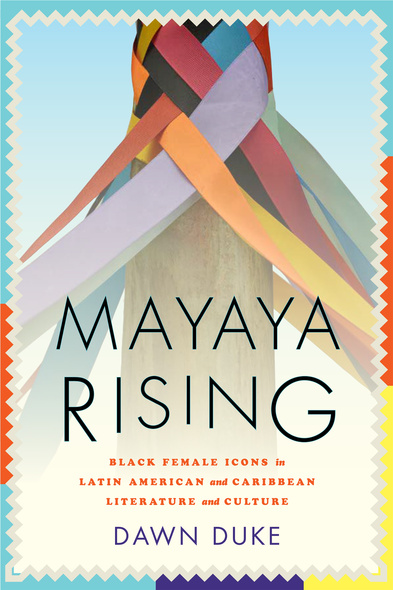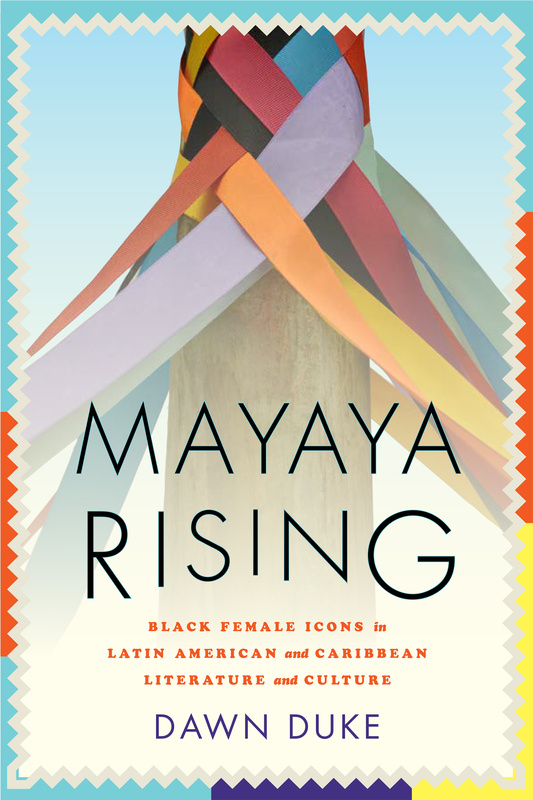
272 pages, 6 1/8 x 9 1/4
Paperback
Release Date:13 Jan 2023
ISBN:9781684484386
Hardcover
Release Date:13 Jan 2023
ISBN:9781684484393
Mayaya Rising
Black Female Icons in Latin American and Caribbean Literature and Culture
By Dawn Duke
Bucknell University Press
Who are the Black heroines of Latin America and the Caribbean? Where do we turn for models of transcendence among women of African ancestry in the region? In answer to the historical dearth of such exemplars, Mayaya Rising explores and celebrates the work of writers who intentionally center powerful female cultural archetypes. In this inventive analysis, Duke proposes three case studies and a corresponding womanist methodology through which to study and rediscover these figures. The musical Cuban-Dominican sisters and former slaves Teodora and Micaela Ginés inspired Aida Cartagena Portalatin’s epic poem Yania tierra; the Nicaraguan matriarch of the May Pole, “Miss Lizzie,” figures prominently in four anthologies from the country’s Bluefields region; and the iconic palenqueras of Cartagena, Colombia are magnified in the work of poets María Teresa Ramírez Neiva and Mirian Díaz Pérez. In elevating these figures and foregrounding these works, Duke restores and repairs the scholarly record.
[A] carefully detailed and focused discussion of Afro-Latina/Caribbean women writers from Cuba, Dominican Republic, Nicaragua, and Colombia. Duke discusses strategies of resistance, recuperation of memory, and rewritings of history, centering her reading of Afro-diasporic women’s literature transversally within Hispanic Caribbean and Latin American Literature Studies. It is a much-needed repositioning . . . ‘Enhorabuena,’ Dawn Duke. As an Afro-Boricua writer, I celebrate Mayaya Rising. Latin American and Caribbean Literary Studies need more books like this.
Mayaya Rising tells the stories, and the stories of telling the stories, of an incredible set of previously ignored Afro-Latin American and Afro-Caribbean women. It makes clear the iconic potential of these women, the work that icons do, and the work it takes to productively iconize Afro-Latin American and Afro-Caribbean women.
Dawn Duke’s study of black women writers in the Hispanic Caribbean—its continental components included—breaks important new ground. Its intersectional stress on race and gender illuminates the path of authors who draw strength from feminist and anti-racist legacies owed to iconic ancestresses. The cultural and linguistic diversity of this literary corpus pulverizes homogenizing assumptions about ‘Spanish American’ literature.
Mayaya Rising is a nuanced continuation of Duke’s 2008 work, Literary Passions, Ideological Commitment, wherein the author critically examines the nationalist practices that impede self-actualization of Black female historical representation in Cuba, the Dominican Republic, Nicaragua, and Colombia. . . . That which Duke accomplishes with this work is critically establishing a female-centric revisionist history located within the contributions of Afro-descendant cultural practitioners whose literary, artistic, and activist endeavors continue to shape and enrich national narratives in these countries.
DAWN DUKE is a professor of Spanish and Portuguese and chair of Portuguese at the University of Tennessee, Knoxville. She is the author of Literary Passion, Ideological Commitment: Toward a Legacy of Afro-Cuban and Afro-Brazilian Women Writers (Bucknell), editor of A Escritora Afro-Brasileira: Ativismo e Arte Literária, and coeditor of Celluloid Chains: Slavery in the Americas through Film. She has published more than twenty-two articles and chapters.
Introduction: The Fundamentals of Glory
PART I
A Cuban/Dominican Case Study
1 Teodora and Micaela Ginés: Myth or History?
2 The Invention of History through Poetry: A Dominican Initiative
PART II
A Nicaraguan Case Study
3 Tracing the Dance Steps of a “British” Subject: Miss Lizzie’s Palo de Mayo
4 From “Mayaya las im key” to Creole Women’s Writings
PART III
A Colombian Case Study
5 Rituals of Alegría and Ponchera: The Enterprising Palenqueras
6 Palenquera Writings: A Twenty-First-Century Movement
Conclusion
Acknowledgments
Notes
Bibliography
Index





